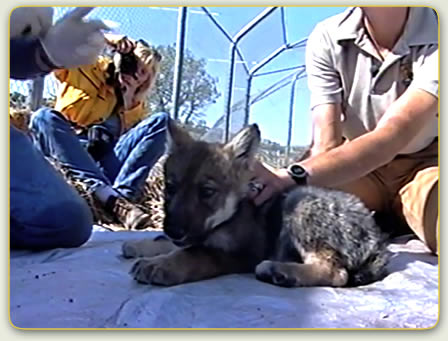04
Sep
News Release: Political Mudwrestling on Mexican Wolf Science

By: Public Employees for Environmental Responsibility (PEER)
Washington, DC September 4, 2012 – Key scientific findings on what is needed to recover the foundering Mexican wolf in the American Southwest have become bargaining chips with states hostile to reintroduction of this nearly extinct predator, according to documents posted today by Public Employees for Environmental Responsibility (PEER). The virtual veto power given to states by the Obama administration has left the fate of the Mexican wolf in limbo, despite a clear scientifically-supported recovery plan.
The documents obtained by PEER under the Freedom of Information Act illustrate U.S. Fish & Wildlife Service officials making decisions based on political consequences rather than on what is the best science or what is best for the Mexican wolf, among the most endangered mammals on the continent, including:
Giving affected states power to bar designation of Mexican wolf habitat within their borders, even if that habitat is unquestionably suitable, with assurances such as “we need Utah support to have recovery of Mexican wolves in Utah” and “we are not going to focus recovery on the backs of Colorado and Utah”¦”, according to minutes from a November 2011 federal-state meeting;
Trading off protections for Mexican wolves at the expense of gray wolves — “By acknowledging that the range of the Mexican wolf includes these five states [AZ, NM, CO, UT and TX] through a subspecies listing, the Service would be able to justify delisting the gray wolf in these states” (emphasis in original), according to agency “talking points” for bargaining sessions; and
Refusing to defend its own Science and Planning Subgroup on Mexican wolf recovery, consisting of eight of the nation’s top experts, from attacks by states, such as this barb from Utah officials — “the individual members are qualified from an academic or experience standpoint, but their philosophical preference for widespread distribution of wolves throughout the Rocky Mountains is pervasive in their recommendations” — recommendations the Service has yet to adopt.
“By choosing to politically appease recalcitrant states, the Fish & Wildlife Service is pursuing a strategy that will delay for at least another decade any effective efforts to recover wild populations of Mexican wolves,” stated PEER Executive Director Jeff Ruch, noting that the Science and Planning Subgroup draft recovery criteria have been sitting on a shelf for a year. “Further delay will harm the genetic health of this struggling subspecies and jeopardize prospects for its future recovery and delisting.”
In June, PEER filed a scientific misconduct complaint against federal and state officials for their actions on Mexican wolf recovery. The complaint was made under recent Department of Interior rules purporting to ban political manipulation of science and to root resource-related decision-making in only the best available science. The PEER complaint has been forwarded to a Fish & Wildlife official who is still investigating his own agency and its partners.
“These documents depict in detail the political machinations driving what are supposed to be purely science-based decisions,” added Ruch. “These documents also strongly suggest that lawsuits are the main factor preventing the science from being completely corrupted or chucked overboard.”
Read FWS talking points for state meetings
See Utah pushback on Mexican wolf options
View meeting notes for November 2011 federal-state session
Examine the PEER Mexican wolf scientific integrity complaint
Look at lack of independence of Interior scientific integrity reviews
This news came from YubaNet
*****************************************************************************
Please contact the decision-makers responsible for the Mexican gray wolf’s recovery and tell them political interference in the future of this critically endangered animal is unacceptable.
You can use these talking points in your message:
A new, scientifically valid recovery plan is necessary to the continued survival of this critically endangered wolf. Over 13 years since they were first introduced into the wild, there are fewer than 60 Mexican gray wolves in the wilds of Arizona and New Mexico, making them the most endangered wolf in the world. These wolves cannot afford further political obstacles to sound planning for their recovery.
Science, not politics, must guide the recovery of these important animals. The scientists on the recovery team must be allowed to do their work unhindered by political pressure. The draft recovery criteria must not be corrupted by politics.
The Obama administration made a commitment to scientific integrity that the Fish and Wildlife Service has clearly violated. This calls for a full independent investigation of the PEER complaint.
The majority of New Mexico and Arizona voters support the Mexican wolf reintroduction. Polling showed 69% support in New Mexico and 77% support in Arizona.
Send your message to
Secretary of the Interior Ken Salazar feedback@ios.doi.gov
US Fish and Wildlife Service Director Dan Ashe dan_ashe@fws.gov
US Fish and Wildlife Service Southwest Regional Director Benjamin Tuggle
USFWS Acting Southwest Regional Director Joy Nicholopoulos Joy_Nicholopoulos@fws.gov
Thank you! We would appreciate an email letting us know that you’ve taken action on this important issue: info@mexicanwolves.org
CLICK HERE to join our email list to stay informed and get more involved with efforts to recover Mexican wolves from the brink of extinction.



